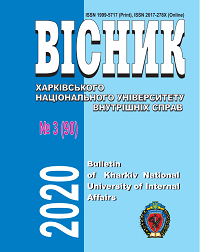Problematic Issues of Protecting Property Rights from Illegal Actions of Public Authorities
DOI:
https://doi.org/10.32631/v.2020.3.03Keywords:
property right, property claim, bona fide purchaser, public authority, proper administration.Abstract
Property right is one of the key legal institutions of society, and the protection of property right plays an important role in guaranteeing this institution. The issue of protection of property right remains problematic, when there is a conflict of interest between bona fide purchasers and original owners, especially in cases where the original owner is the state or local community, which misused the property and therefore, initiated the process of illegal transfer of the property right. There are serious differences in law-enforcement practice regarding the views on resolving disputes over the recovery of state or municipal property from bona fide purchasers. The most problematic in these cases is the establishment whether the property was taken out of the possession of the owner or the person to whom he transferred the property into possession, not on their will (paragraph 3 of Part 1 of the Art. 388 of the Civil Code of Ukraine). They usually try to prove the illegality of the decision of public authorities or local self-government agency in these cases and that their actions were committed in excess of authority.
The author has studied the problematic issues of deprivation of the property right of a bona fide purchaser due to illegal actions of public authorities in case of concluding agreements on this property. Aspects of proportionality of state intervention into the property right of a person in accordance with the standards of the European Court of Human Rights have been analyzed, taking into account the principle of proper administration. When deciding on the possibility of depriving a person of property due to an error made by a public authority, the following should be taken into account: 1) the position of the ECHR, according to which the need to correct a former “error” should not disproportionately interfere with the new right acquired by a person who expected to rely on the legitimacy of good faith actions of a state agency; 2) the claim may be made within the guarantees provided in the Art. 1 of the Protocol No. 1; 3) violation of the property right, in particular the possibility of claiming the disputed property, which went beyond the will of the owner, according to the provisions of the Art. 388 of the Civil Code of Ukraine; 4) the existence of a direct legislative prohibition on the alienation of the relevant property from state property, when, for example, it is established by the Law of Ukraine; 5) the purpose of interfering in the peaceful possession of a person’s property should be the real protection of the property right, and not the delimitation of powers between public authorities.
Downloads
References
Fulei T.I., 2015. Application of the case law of the European Court of Human Rights in the administration of justice [Zastosuvannia praktyky Yevropeiskoho sudu z prav liudyny pry zdiisnenni pravosuddia]. 2nd ed. Kyiv.
United Nations Development Program, 2002. Human Development Report 2002: Deeping democracy in a fragmented world. New York: Oxford University Press. Available at http://hdr.undp.org/sites/default/files/reports/263/hdr_2002_en_complete.pdf [Accessed 17 September 2020].
Yezerov A. and Batan Yu., 2016. Proper governance and provision of administrative services by local governments [Nalezhne vriaduvannia i nadannia administratyvnykh poslukh orhanamy mistsevoho samovriaduvannia]. Ûridičnij vìsnik – Law Herald, No. 2, pp. 109-116.
Spasybo-Fatieieva I.V. (ed.), 2020. Legitimate expectations [Pravomirni ochikuvannia]. Kharkiv: EKUS.



